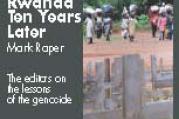Click here if you don’t see subscription options



Unleash the Capitalists
How disillusioning to read your editorial Trading Jobs (4/5). I expected something better from a Jesuit publication than this stale diatribe on American capitalism.
To begin, let me compliment you on your initial observation on the outsourcing phenomenon. The loss of jobs due to their exportation is indeed a very small portion of the overall job losses in the current economy. This is as true now as it has been throughout our history. Currently, because of its emotive power, outsourcing is a lightning rod for political purposes.
As to your further observations on the American economy and your prescriptions for job creation, let me offer the following counsel. It is not the role of any business to create jobs. It is the responsibility of a business to make a profit (within an overall defined legal, moral and ethical milieu) and to provide this profit to the investors in the form of a return on their capital. The creation of jobs is an ancillary byproduct of American business. Although employee considerations should be an important factor in any business decision, no businessperson who wishes to stay in business long can translate this consideration into a mandate for job creation or retention. To do so would be economic suicide.
As to your recommendation for the inclusion of labor unions, community organizations and environmentalists in the negotiating of trade agreements, we should remember that these are international economic compacts, not political ones. Unless you are a proponent of the creation of an international economic quagmire instead of a global marketplace, these institutions would be better served at the local and national negotiating tables.
Your two-part prescription for government intervention in the form of increases in new taxes on business and increases in public funding for job re-training are quite frankly tired, old and ill conceived. Historically, raising taxes and/or increasing the government bureaucracy are steps toward stagnation and decline, and have been no solution for any economic problem.
As for your proposed formula of improvements by the business community, they are similarly misguided. Contrary to your opinion, the unequivocal fact is that high-stakes gambling is not the economic function of options and derivatives. Risk-aversion, however, is. Risk-aversion is a fundamental economic principle. Corporate takeovers do generate enduring health for the companies involved, although not necessarily in their original form. Preoccupation with quarterly returns, although a factor in business decision making, is but one of many variables considered in making decisions on long-term investment.
In conclusion, let me concur with your observation that only the business community can bring major improvements in employment prospects. The purpose of these improvements, however, should not be, as you say, to rein in aggressive capitalism. Rather, they must be for the purpose of unleashing American capitalism. Only free markets can create jobs.
Michael McGreevy







Peer Review
Regarding Bishop Emil C. Wcela’s title query, What Did I Miss? I should like to suggest that the missing category about which he is puzzled is the use of peer review (3/15). If seminarians had been polled regularly, perhaps some weeks before the seminary authorities met to discuss and vote on the candidates for priesthood at the end of each academic year, much more could have been learned about the candidates and their ability to relate effectively and appropriately. While peer review never tells the whole story, it does add another dimension. Ordained in 1965, I too, like the bishop, wish I could have been more effective, but there was no way at the time to help.
(Rev.) Stephen F. Duffy
